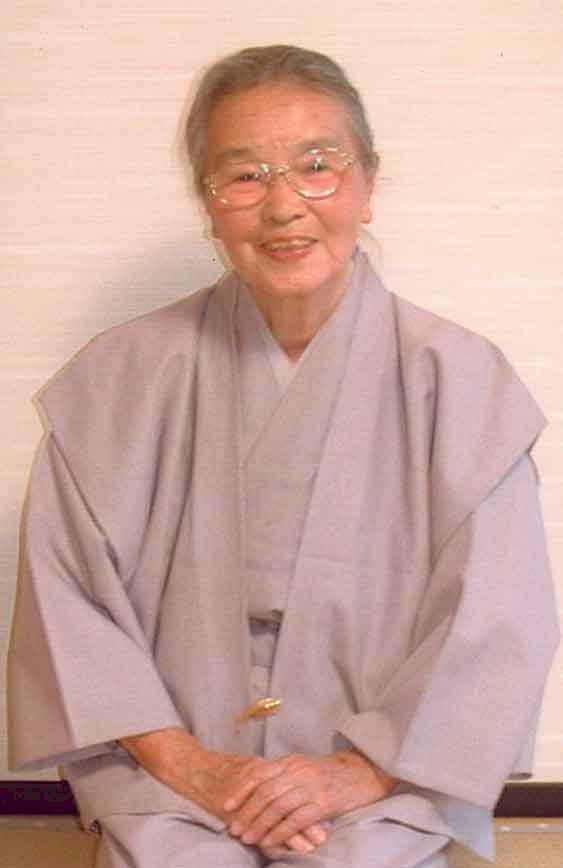|
|
About the Book
About Suzuki Roshi |
An Excerpt from
|
 Bodhisattva Archetypes: Classic Buddhist Guides to Awakening and their
Modern Expression Bodhisattva Archetypes: Classic Buddhist Guides to Awakening and their
Modern Expression
focusing on Mitsu Suzuki, Shunryu's widow by Taigen Dan Leighton, (Penguin Arkana, New York, 1998); ©1998 Taigen Daniel Leighton. [More on this book and others by Taigen Dan Leighton] More excerpts from this book Go to Mitsu Suzuki Main Page Exemplars of Avalokiteshvara Another exemplar of the Avalokiteshvara archetype in my personal experience is Mrs. Mitsu Suzuki, the widow of Shunryu Suzuki Roshi, the founder of the San Francisco Zen Center. Mrs. Suzuki, who in 1961 moved to San Francisco to be with her husband at his Japanese-American temple, is herself a quietly important figure in the still short history of American Zen. For more than twenty years after her husband died in 1971, Mrs. Suzuki stayed on, living at the Zen Center he had established with his American meditation students. Although she did not finally return to Japan for more than thirty years, America remained a strange country to her and English a difficult language. But she amiably remained as a quiet presence and much-loved guide and example to several generations of Zen students. Mrs. Suzuki would never have thought of trying to impose her views or opinions, but kindly and clearly embodied simple principles of compassion and generosity, even through difficulties that embroiled the Zen Center community. Her example helped many of us stay focused on the real work during stressful times. Throughout, she remained cheerful. I recall her daily vigorous walking exercises down the halls of the residence building, widely swinging her arms and smiling at the bemused students as they passed. Mrs. Suzuki has a keen sense of the Japanese aesthetic, a contemplative sensibility that is inextricably linked to Zen practice, and which she expresses as a fine haiku poet. Some of her haiku, which have appeared in Japanese journals, have also been translated and published in English. These short poems are concentrated distillations of immediate experience. The following examples might be seen as descriptions of Avalokiteshvara, simply but carefully observing the sounds and doings of her world and herself:
Mrs. Suzuki expresses the strict side of Zen compassion. She helped train and refine Zen students while acting as a teacher of the Way of Tea, commonly referred to as Tea Ceremony. Suzuki Roshi had suggested she take up tea practice, and it became a vehicle for her to share the background of his teaching after he was gone. Mrs. Suzuki used tea and the sensitive handling of its many traditional utensils as skillful means, frequently demonstrating "tough love" in her sharp-tongued criticism of students’ lack of attentiveness to the details of the tea-making forms and choreography. Her lessons helped many Zen students expand their sense of presence, and learn to care for their everyday surroundings. This tea practice has evolved over the centuries in Japan to foster awareness and respectful consideration for others in the simple act of kindly preparing, serving, and drinking a cup of tea. Along with the tea itself, the Way of Tea encompasses the practice and appreciation of many everyday handicrafts, such as flower arranging, garden design, pottery, and calligraphy, which have been widely absorbed into Japanese daily life as gentle expressions of spirituality. In addition to tea, Mrs. Suzuki taught some students the Japanese way of sewing formal tea ceremony garments and meditation robes. One student especially recalls Mrs. Suzuki’s hands as "small and very well kept. When she picks something up, even if it’s as seemingly insignificant as a pin, her hands and the object seem to know each other. The way a pin or a piece of fabric is held becomes a teaching in such hands." Just in the dimension of such ordinary activities with traditional implements, Mrs. Suzuki was able to teach her students the heart of kindness, and with (Kannon-like) supple hands of compassion, assembled an ocean of blessing. |
|
